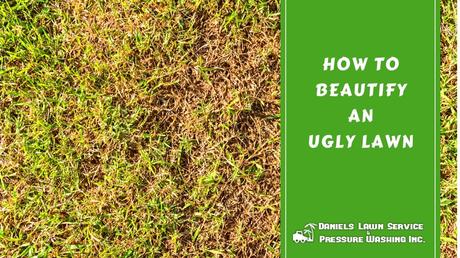
Spring is here in Central Florida , but the rainy season hasn't quite caught up yet. Because of this, you may find your lawn looking more brown than green lately due to the lack of rain and the increasingly scorching sun bearing down on your lawn day after day. Have you thought to yourself, "Is there anything I can do about my lawn?" The answer is yes - but only with the right lawn care and landscaping techniques. If you're spending more time at home lately, this may be the perfect opportunity to work on beautifying your lawn once again, with the help of Daniel's Lawn Service and our expert knowledge.
Keep reading to learn what factors can cause a browning lawn, how to revive a brown lawn, and how you can prevent future brown lawn problems!
Fungus and Other Lawn Problems
Not getting enough water is only one of many problems your lawn could be facing. In fact, over-watering can cause its own complications. During the spring and summer months of Florida, your lawn may be susceptible to many other threats to its health and vibrancy, such as lawn fungus.
Let's take a look at five common lawn diseases in Florida :
- Brown Patch Fungus - Brown patch fungus is especially aggressive on lawns with St. Augustine grass or Zoysia grass, starting off small and spreading to several feet wide over time. You'll see it develop most often through November to May after heavy rains or from over-watering. You can identify brown patch lawn fungus by the transition from yellow, to reddish-brown, to straw-colored grass. You may also notice circle patches of browning grass surrounded by a dark narrow ring of grass or the opposite of green grass surrounded by a ring of brown-yellow grass. Grass leaves affected by brown patch fungus may also develop tanning spots with darker brown edges.
- Grey Leaf Spot - Initially similar in appearance to brown patch fungus, grey leaf spot differs by attacking the tops of leaves. You may notice lengthy brown spots on your leaves that over time develop grey velvety growths within, eventually leading to longer and more irregularly shaped spots. Grey leaf thrives when humidity levels are high and also when rainfall increases. If affected by grey leaf spot, your grass will struggle to grow.
- Rust Fungus - Rust fungus earns its name from its rust-like appearance as a powdery orange-yellow color that will turn you grass into similar rusty hues. The "powder" is actually spores produced by the small yellow flecks or bigger dark yellow spots on the leaves. Shaded grass is particularly at risk for rust fungus where moisture sticks around more often. Rust fungus kills your lawn leaf by leaf, and weakens it to other threats.
- Fairy Ring - The name of fairy ring may come from the stuff of myths and legends, but its effects on your grass are very real. It's pretty easy to spot fairy rings by their rings of dead or sometimes dark green grass surrounding more healthy patches, occasionally accompanied by mushrooms along the rings. What makes them so tricky is that they can persist over many years, and they kill your grass by releasing mycelium, which is a substance that prevents water from reaching the roots of your grass.
- Dollar Spot - Dollar spots earn their name from the silver dollar-sized spots and patches of dead grass that spread across lawns. Eventually, those smaller spots will develop across much bigger areas, taking down your grass all the way to the roots. Dollar spots spread the most in hot, humid temperatures. You can identify dollar spots by the tan spots with reddish-brown edges on your grass, which will eventually become more white or straw-like in color over time, along with noticing mycelium when early morning dew is on the grass.
Aside from lawn fungus and diseases, other potential causes of a brown lawn include improper fertilization, over-watering or under-watering, and pest infestations.
Can a Brown Lawn Be Revived?
With so many risk factors for damage to your grass, is it even possible to revive a brown, dying lawn? Absolutely! However, it will take time and following the right lawn care techniques recommended by professional lawn care specialists. Some of the basics to reviving your lawn include:
- Time your irrigation - Keep your lawn watering on a schedule that fluctuates with the seasons, rainfall and your lawn's present needs. Both too much or too little water can harm your lawn and encourage further damage.
- Implement routine fertilization - Fertilizing your lawn on a routine basis, at least four times per year, will help your grass get the nutrients it needs for every season.
- Annually weeding and feeding - Weeding and feeding your lawn at least once a year cuts down on the risk of the spread of grass diseases from weeds and other harmful plants.
- Regularly treat for pests- Your lawn should undergo professional pest control treatment, including lawn fungus control with fungicides, at least twice a year to keep pests like bugs and fungi far away from harming your grass.
Preventing Future Brown Lawn Problems
By now, you might have a plan in place to tackle your lawn's current brown patches, but what do you do to keep them from coming back? Preventative measures are extremely important for maintaining a vibrant, healthy lawn. Help your lawn recover from fungi by regularly treating your lawn with fungicides both during the on and off seasons. However, it's important to consult with a lawn care or landscaping specialist before starting a preventative treatment regimen in order to not do worse damage to your lawn (or your wallet) in the long run.
Of course, the best way to prevent damage to your lawn is to keep up with the maintenance routines you put in place to help revive it! These include the previously mentioned irrigation, fertilization, weeding and feeding, and pest treatment routines.
Get Better Results with the Experts
You can work on your lawn on your own, but the chances are high that the same brown spots, fungi and pests won't be gone for long. Get better results for a vibrant green lawn with the help of our lawn care and landscaping experts! Based locally in Central Florida, Daniel's Lawn Service & Pressure Washing provides experienced lawn care professionals who can give you the most accurate advice for your lawn, along with the highest quality lawn maintenance and landscaping services. today to discuss your lawn care needs.

